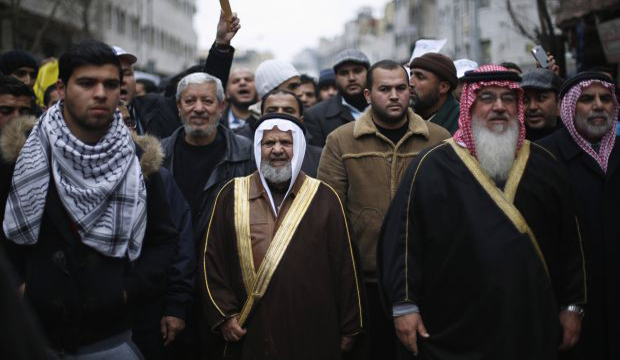
Leader of Jordan's Muslim Brotherhood Sheikh Hammam Said (C), takes part during a protest against satirical French weekly newspaper ‘Charlie Hebdo’ after the Friday prayer in Amman. Jordan, on January 16, 2015. (Reuters/Muhammad Hamed)
Amman, Asharq Al-Awsat—An emergency meeting of senior figures from Jordan’s branch of the Muslim Brotherhood concluded on Tuesday without reaching a solution to the divisions that have recently split the group.
Although a number of possible solutions were put forward during the meeting, members of the group’s Shura Council, which decides on all major policy decisions, failed to reach an agreement and have scheduled a follow-up meeting for later this month.
“The Shura Council postponed its meeting until March 19 to allow for further consultations over the number of proposals that have been put forward,” Shura Council Chairman Nawaf Obeidat told Asharq Al-Awsat.
“The Shura Council is keen to find a consensus solution to this crisis,” he added.
The emergency meeting was held after Amman officially licensed a Muslim Brotherhood splinter organization, with both the original group and the new splinter group now claiming to represent the official Jordanian Muslim Brotherhood.
Following the controversy, Jordanian Prime Minister Abdullah Ensour met with a delegation from the original Brotherhood group, stressing that Amman’s licensing of the new splinter group did not change the status of the original group and that it was up to the courts to resolve the issue.
The proposals to resolve the division include reforming the Muslim Brotherhood’s executive body and expanding it to include 11 instead of nine members. This would require an amendment to the Brotherhood’s regulations.
Although this option has been backed by Jordanian Muslim Brotherhood leader Hammam Said, it would also require the agreement of two-thirds of the Shura Council to push through the amendment.
This solution would see Jordan’s Muslim Brotherhood reform, with the splinter organization returning to the fold but with a much larger share of power.
However, Obeidat said there had been no discussion regarding the removal of Said, stressing that this was an elected position.
He told Asharq Al-Awsat the Shura Council had agreed not to vote on any of the proposed solutions during its Tuesday meeting, and hold further consultations during the next session.
In an official statement issued on Monday, Jordan’s Muslim Brotherhood unanimously condemned Amman’s “so-called licensing” of the splinter group, warning that the move threatened the group’s own presence and legitimacy.
